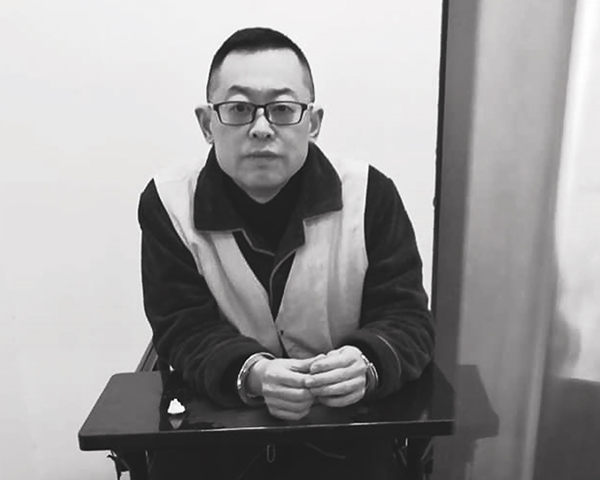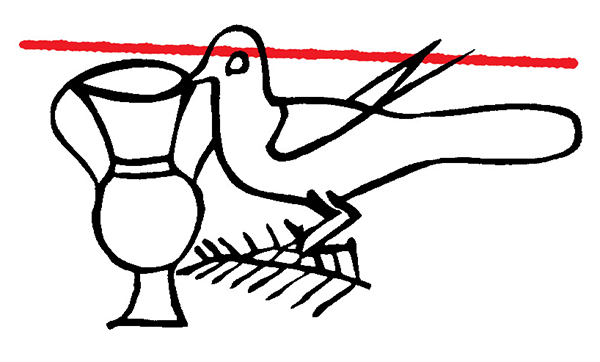Subtotal: $
Checkout-

Baptism Means Leaving Home to Find It
-

Felix Manz: The Making of a Young Radical
-

The Return of the Bison
-

The Communion of Empty Hands
-

Poem: “Zeal”
-

Poem: “Winter”
-

Editors’ Picks: Demon Copperhead
-

Editors’ Picks: How to Inhabit Time
-

Editors’ Picks: Faith, Hope and Carnage
-

The Gift of Palliative Care
-

Transforming Food
-

On Planting Sugar Maples
-

Letters from Readers
-

Covering the Cover: Pain and Passion
-

Oberammergau’s Broken Vow
-

The Unutterable Silence of God
-

The Mind in Pain
-

In Search of Solace
-

Where Are the Churches in Canada’s Euthanasia Experiment?
-

Letters from a Vanishing Friend
-

The Dust on All the Faces
-

Two Thousand Years of Christian Strangeness
-

God’s Purpose in Your Pain
-

Saving Friends: What I’ve Learned from Insufferable Patients
-

The Speaking Tree
-

The Way of the Passion

Chinese Christians’ Costly Allegiance
A house church pastor imprisoned in China calls Christians to face repression boldly.
By Wang Yi
March 14, 2023
Next Article:
Explore Other Articles:
The writer of the following sits in a Chinese prison. Wang Yi is perhaps China’s best-known pastor of a house church since the day in December 2018 when he opened the church door and faced a crowd of officers who arrested both him and his wife, Jiang Rong. Officers also tracked down and arrested the entirety of Early Rain’s leadership structure and dismantled the church’s social and educational initiatives, which included mental health and foster care programs and care for the elderly and the families of prisoners.
Wang Yi’s thought and writing have developed over the years since his conversion in 2005; his training as a legal scholar influenced by both Western and Chinese political philosophy goes hand in hand with his development as a theologian and Biblical scholar who has shifted his focus increasingly from the topic of rights to the kingdom of God and eschatology.
For Wang Yi and other Chinese Christians these are not ivory-tower matters but immensely practical theology in an unceasingly challenging situation. Wang Yi’s work reminds us to consider that all authorities and powers, governing or cultural, are in competition with God the Creator for the highest love and allegiance of humankind. There will be times when maintaining our proper allegiance to King Jesus alone will require of us “faithful disobedience.” —Hannah Nation

Wang Yi in prison.
The office of apostle is inseparable from the status of being a prisoner.
Paul is a prisoner who has made an appeal to Caesar for his case. However, Paul has been imprisoned and his case delayed for two whole years; the identity of “prisoner” clings to him. He is also renting the house where he is imprisoned. This is just like the time during the Cultural Revolution where if you were executed by shooting, you would have to pay for the bullet as well. Paul’s prison was not a place where you could eat and sleep for free; prisoners were required to bear the cost of being imprisoned. This was truly unfair. Although Roman law was more civilized than ancient Chinese law, it’s uncivilized compared to our modern laws: Paul, at this time, had neither religious nor basic human rights. However, when Paul emphasizes the two years in which he was imprisoned, and the consequent boldness with which he preached and the fruitfulness of unhindered ministry, he doesn’t define his situation by his suffering. Instead, he sounds like he’s describing a type of opportunity. What Paul cares about, and even what the narrator, Luke, is concerned about, is not the way by which they came to Rome, but their purpose for coming there.
The gospel creates a paradox in this situation. As each day passes, and being a prisoner seems more and more like Paul’s permanent status, he becomes more and more like an apostle. His physical body is imprisoned, but the gospel is free and unhindered. This is exactly what Paul means when he writes, “For I think that God has exhibited us apostles as last of all.” The apostles are compared to the prisoners of war who are paraded by a triumphant Roman army to highlight the glory of their victory. In this sense, the apostles are captives who reveal the glory of Christ’s kingdom. If the gospel implies that this world is enemy-occupied territory, then the office of apostle is inseparable from the status of prisoner.
Source: “The Mission and Labor Camp of the Gospel,” 2013.
The demands of the house churches are, in essence, the demands of the gospel.
In 1955, Wang Mingdao wrote, “We – For the Sake of Faith,” which became the Chinese church’s statement of defense before kings and society. For decades, house churches in China have defended and sought religious freedom and freedom of conscience for the sake of the gospel. Although it continues to suffer government persecution, the church strives to preach the gospel of Christ, and it does not stop worshiping and gathering together. Although it lacks legal status, the church still forms community life for tens of millions of citizens in contemporary China.
People ask, “Aren’t house churches illegal?” I want to answer honestly: yes. For sixty years, house churches have been illegal in terms of church worship, assembly, doctrine, religious property, the sacraments, evangelism, missions, theological training, pastor ordination, publishing, children’s Sunday school ministry, and charity work. For sixty years, house churches have taken a posture of “nonviolent noncooperation” to violate all aspects of China’s religious management and related legal enforcement. To deny this is to deny the road they have been traveling on, and to deny the reality of church-state conflict in China for the last half century.

The early Christian symbols in this article are based on paintings and engravings found in Roman catacombs. Artwork reproduced in L. Perret, Les Catacombes de Rome (Paris, 1851).
But here is the more important question: Is the Chinese government illegal? We should honestly and courageously respond: yes. For sixty years, this country has continuously trampled upon its own constitution and laws regarding religious freedom. Whether it is church worship, freedom of assembly, doctrine, religious property, the sacraments, missions, seminary training, pastor ordination, publishing, children’s Sunday school, charity work, and so on, the government uses illegal, autocratic, and barbarous methods to oppress the church and the children of Christ in China.
So, again we ask, “Aren’t house churches illegal?” If the Bible is the “constitution” for Christians and the church, then over the past sixty years the house churches have been the paragon of following God’s law and freedom of conscience in Chinese society. I must say that we have not violated the higher, most supreme law (James 2:8). Moreover, precisely because we must observe that law within our hearts, we have not dared not to violate the system of religious regulations that deprives and controls the Christian’s mission to worship God and preach the gospel.
“Aren’t house churches illegal?” If the constitution is “the king” of the modern state, if the Chinese government claims that its power comes from the Chinese constitution and that it must comply with the constitution, I must honestly answer that for sixty years the house churches are the perfect model for submitting to the king and following the constitution. The church follows the constitution up to a point, even though all government officials have chosen to defy it, imprisoning those who do not violate the constitution with them. Still, the church continues to act “according to law” by upholding the constitutional right to worship God and preach the gospel just as before. And because we must abide by a higher “constitutional power,” we dare not comply with the unconstitutional actions of the religious administrative system.

The demands of the house churches are, in essence, the demands of the gospel. This demand is in direct conflict with the state. Article 35 of the constitution guarantees “freedom of religious belief.” In other words, social transformation, political progress, freedom, democracy, the rule of law, human rights – these are all good things in the eyes of Christians. But they are never the true pursuit of the church. Whether it is slavery or democracy, monarchy or rule of law, the Bible teaches that the church must obey the government’s authority. In short, the church of Christ is not at all interested in any political and legal system. However, under any political and legal system the church claims the freedom to worship God and proclaim the gospel.
Therefore, during sixty years of religious persecution, the house churches have continuously adopted peaceful, patient means to become law-abiding representatives of Chinese society. Lord permitting, the church is willing to suffer under any system in order to comply with any unfair and unjust law. However, the one law that the church cannot obey is the law that attempts to deprive and control our worship of God and proclamation of the gospel. In the public sphere, the church must regard these laws as “unconstitutional.” In terms of our faith, the church must also regard these laws as evil and anti-Christ.
We raise our voice to seek mercy for all of our persecutors.
As a house-church pastor, I thank and praise God Almighty for all persecution and restrictions suffered by the church. God foreordains everything according to his good and blameless will. He trains and purifies his church and his children in China. Moreover, he gives us the most unmerited blessing of suffering for righteousness’ sake (1 Pet. 3:14). In a larger sense, and even on a personal level, I actually prefer for persecution to continue. I am also willing to submit to God’s will and prepared to endure a more protracted church-state conflict; this would be incomparably better for our spiritual life and for our final hope.
But we raise our voice to seek mercy for all our persecutors. They do not believe in the gospel of Christ and they do not believe in God’s righteous anger and curse. But do we believe the gospel?
We raise our voice because we take pity on those compatriots who cannot have more freedom and more opportunity to hear the gospel. They cannot attend churches because of religious persecution. They do not believe the gospel of Christ and they do not care about what they have lost. But don’t we care?
We raise our voice also due to our frequent weakness under persecution. “If it be possible, let this cup pass from me; nevertheless, not as I will, but as you will” (Matt. 26:39). With year after year of persecution and restrictions, we recognize that Christians often feel cowardly and afraid. They carry anger and bitterness, and even in the midst of suffering it is hard to avoid feeling self-righteous and prideful. Therefore, we are not chasing after the hero of religious freedom. We are petitioning the Lord Jesus Christ to keep our generation from temptation and deliver us from evil, lest we are “so utterly burdened beyond our strength” (2 Cor. 1:8) that we dishonor the name of the Lord.

Sixty years ago, the Chinese government terrorized Christians into handing over their names and identities to Caesar. From 1950 to 1954, some 410,000 Christians (approximately 50 percent of Christians at the time) voluntarily or under duress signed the Three-Self Patriotic Manifesto. They openly betrayed the Lord Jesus Christ and his church; the effect was to withdraw the church from public society.
Sixty years later, the Lord’s church needs to call every Christian once again, for the sake of the gospel, to hand over their names and identities. We have a responsibility to use a different call – our appeal and petition, apologetics, and signature campaign – to make our own public confession to defend the gospel and the church in the face of those in power. By the blood of Christ, we will wash the Chinese church clean of the Lord’s shame.
What we need is not a religious civil rights movement. What we need is a genuine gospel movement. Our action takes place in this currently unprecedented period of urbanization and social transformation, in which house churches can conduct evangelism trainings, church planting, church transformation, missions work, and obey the gospel’s cultural mandate. Thus the house churches can more firmly establish church membership, build local churches, and form a visible Christian community for the world. We can use the issue of religious freedom to challenge other citizens’ consciences, bring forth the courage of church members, and call those believers who have drifted away to renew their commitment.

The church does not need to proudly fight the state for our nonexistent rights. The church needs to be humble so that this country can be blessed by the benefits of the gospel. We need to request the state to recognize and respect the freedom we already have.
The church also does not at all need or rely on any external “religious freedom” to maintain and live out the Christian faith. On the contrary, over the past sixty years the church has already lived out a true “freedom” because of the Christian faith. Therefore, the church’s petitions, appeals, apologetics, signature campaign, and calls to end religious persecution are not for external benefits for the visible church; rather, they are for the expansion of Christ’s kingdom and the blessing of other communities. “Not only to avoid God’s wrath but also for the sake of conscience” (Rom. 13:5).
Source: “Raising Our Voices to End Sixty Years of Religious Persecution,” 2011.
This article is adapted from Wang Yi, et al., Faithful Disobedience: Writings on Church and State from a Chinese House Church Movement, edited by Hannah Nation and J. D. Tseng (IVP Academic, 2022). Copyright ©️ 2022 by Center for House Church Theology from Urban China. Used by permission.
Already a subscriber? Sign in
Try 3 months of unlimited access. Start your FREE TRIAL today. Cancel anytime.




































